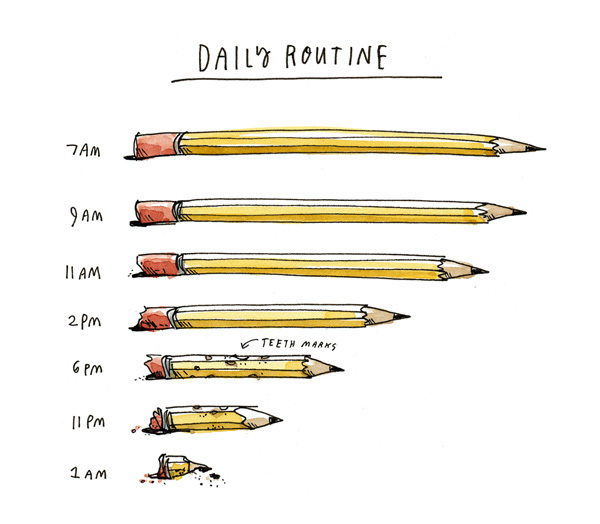Cognitive Science of the Perfect Daily Routine
Geege Schuman stashed this in Writing
Stashed in: #lifehacks, Sleep!, Practice, Flow, Awesome, Writing!, @brainpicker, Context, Rituals, Cognitive Bias
But the key psychological function of such dedicated environments isn’t so much superstitious ritualization — an effort to summon the muse through the elaborate juju of putting everything in its right place — as cognitive cueing. Kellogg considers the usefulness of a special space used solely for writing, which cultivates an “environment that cues the desired behavior”:
This phenomenon can be reinterpreted in terms of the cognitive concept of encoding specificity. The abstract ideas, images, plans, tentative sentences, feelings, and other personal symbols that represent the knowledge needed to construct a text are associated with the place and time of the writing environment. These associations are strongest when the writer engages in few if any extraneous activities in the selected environment. Entering the environment serves as a retrieval cue for the relevant knowledge to enter the writer’s awareness. Once the writer’s attention turns to the ideas that pop into consciousness, the composing process flows again. Particular features of the environment may serve as specific prompts for retrieving, creating, and thinking.
For instance, a scene outside an office window, a painting hanging on the wall, or a plant sitting in the corner may become associated with thinking deeply about a particular text under development. Staring at the feature elicits knowledge representations bearing on the problem at hand.
This strategy is rather similar to the one most often recommended for treating insomnia — instituting a regular bedtime and using the bedroom as a space dedicated solely to sleep, in order to optimize the brain’s ability to enter rest mode upon going to bed and cue that behavior each night just by entering that environment. (Perhaps not coincidentally, many of the most successful writers are also zealous in their sleep habits.)
Context matters. Create an environment conducive to the type of activity you want to get done.
Also, avoid interruption:
The lack of interruption in trains of thought may be the critical ingredient in an environment that enables creative flow. As long as a writer can tune out background noise, the decibel level per se may be unimportant. For some writers, the dripping of a faucet may be more disruptive than the bustle of a cafe in the heart of a city.











6:57 AM Aug 31 2014